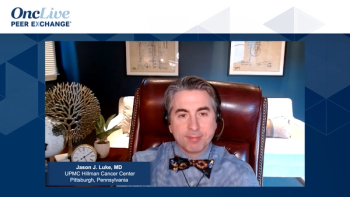
Expert panelists share their perspectives on best strategies to risk stratify patients diagnosed with cutaneous squamous cell carcinoma.

Your AI-Trained Oncology Knowledge Connection!


Expert panelists share their perspectives on best strategies to risk stratify patients diagnosed with cutaneous squamous cell carcinoma.
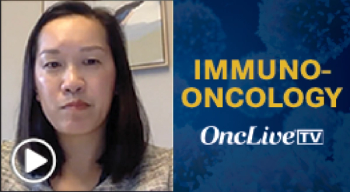
Yvonne Chao, MD, PhD, discusses key trials leading to FDA approvals in metastatic non–small cell lung cancer.

Timothy Burns, MD, PhD, discusses the evolving use of antibody-drug conjugates in HER2-mutant non–small cell lung cancer.
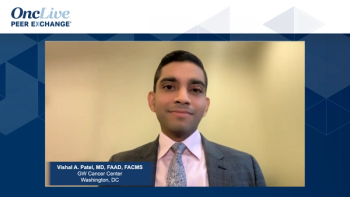
A review of current staging systems used to categorize CSCC, particularly those from the American Joint Committee on Cancer and Brigham and Women's Hospital.
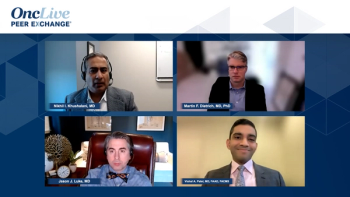
Opening their discussion on resectable cutaneous squamous cell carcinoma (CSCC), expert panelists elucidate its current incidence and known risk factors.
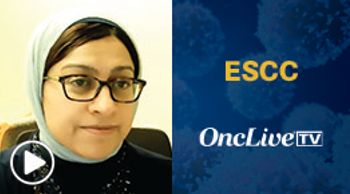
Anwaar Saeed, MD, discusses biomarkers that signal the potential efficacy of frontline immunotherapy regimens in patients with advanced esophageal squamous cell carcinoma.
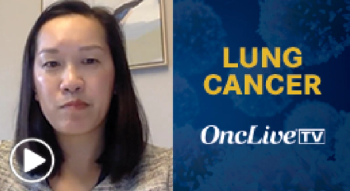
Yvonne Chao, MD, PhD, discusses the study of various PD-L1 inhibitors in patients with non–small cell lung cancer.

Timothy Burns, MD, PhD, discusses the evolution of EGFR-targeted non–small cell lung cancer treatments, the importance of delineating small cell lung cancer subtypes, and the advantages of continued antibody-drug conjugate development across all areas of lung cancer.

The combination of the p38 MAPK inhibitor ARRY-614 plus nivolumab with or without ipilimumab was well tolerated and elicited disease control in high-risk, PD-(L)1–refractory patients with advanced solid tumors.

A new study pinpoints how LAG3 modulates T cell activity, providing important insights for development of other LAG3-blocking therapies for cancer and autoimmune disorders.

Treatment with lisocabtagene maraleucel resulted in a high rate of durable overall and complete responses as second-line therapy in frail patients with relapsed/refractory large B-cell lymphoma for whom hematopoietic stem cell transplantation was not intended, according to preliminary findings from the phase 2 PILOT study.

Present in approximately two-thirds of estrogen receptor-positive breast cancers, the role of ESR1 mutations in disease metastasis is poorly defined.

Adam M. Brufsky, MD, PhD, emphasizes the importance of tyrosine kinase inhibitors in HER2-postive breast cancer and highlights the potential benefits of local salvage radiation therapy in patients with oligometastatic or de novo stage IV breast cancer.

Alexander B. Olawaiye, MD, discusses how to address disparities in cancer care.
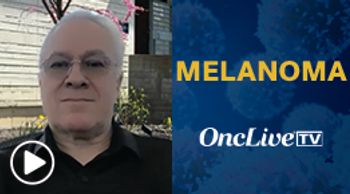
John M. Kirkwood, MD, discusses the utilization of ipilimumab and nivolumab in patients with melanoma with brain metastases.

Jason Luke, MD, FACP, reviews key points from each presentation from an Institutional Perspectives in Cancer webinar on melanoma and provides perspective on the practice-changing benefits of therapies moving into earlier lines of treatment.

Alexander B. Olawaiye, MD, discusses how social and biological determinants can affect care outcomes across cancer subtypes and what steps community and academic oncologists can take to ensure these disparities are recognized.

Alexander B. Olawaiye, MD, discusses front line treatment sequencing considerations in ovarian cancer.

Alexander Babatunde Olawaiye, MD, discusses frontline and second-line maintenance in ovarian cancer, the role of surgery in platinum-sensitive disease, and updates in cervical and endometrial cancers.

Alexander B. Olawaiye, MD, discusses the social and biological determinants of disparities in women’s cancer.

Alexander Babatunde Olawaiye, MD, discusses the investigation of balstilimab plus zalifrelimab in gynecologic cancers.

Adam M. Brufsky, MD, PhD, FACP, discusses the significance of the data from DESTINY-Breast03 with trastuzumab deruxtecan vs T-DM1 for patients with metastatic HER2-positive breast cancer, as well as how the findings set the field up to improve outcomes for patients with brain metastases.

Robert L. Ferris, MD, PhD, discusses the current standard of care for patients with head and neck cancer, the role of HPV in treatment decisions, and the need to personalize therapy for patients.

Adam M. Brufsky, MD, PhD, FACP, discusses the unique mechanism of action of zanidatamab and encouraging efficacy observed in patients with HER2-positive breast cancer.

Adam M. Brufsky, MD, PhD, FACP, discusses the rationale to evaluate enobosarm in estrogen receptor–positive, androgen receptor–positive metastatic breast cancer, prior data observed with the agent, and the unmet needs positive results of the ARTEST trial could potentially fulfill.

Adam M. Brufsky, MD, PhD, FACP, discusses the rationale to evaluate HER2-directed bispecific antibodies in HER2-positive breast cancer, the emergence of zanidatamab as a potential treatment strategy, and the unmet medical need the agent could fill in this disease.
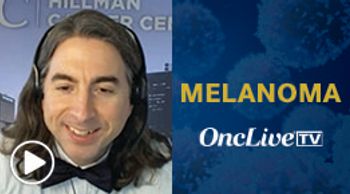
Jason J. Luke, MD, FACP, discusses the toxicities with targeted therapy vs immunotherapy and management strategies for patients with melanoma.

Chemoimmunotherapy is the new frontline standard of care for patients with small cell lung cancer, and other novel agents, such as, bispecific T-cell engagers are in the pipeline and gaining momentum for those who experience disease progression.

Adjuvant pembrolizumab continued to showcase improved relapse-free survival over placebo in patients with resected high-risk stage II melanoma with 6 months of additional follow-up.

Timothy F. Burns, MD, PhD, discusses key developments in the frontline treatment of patients with RET-positive non–small cell lung cancer.